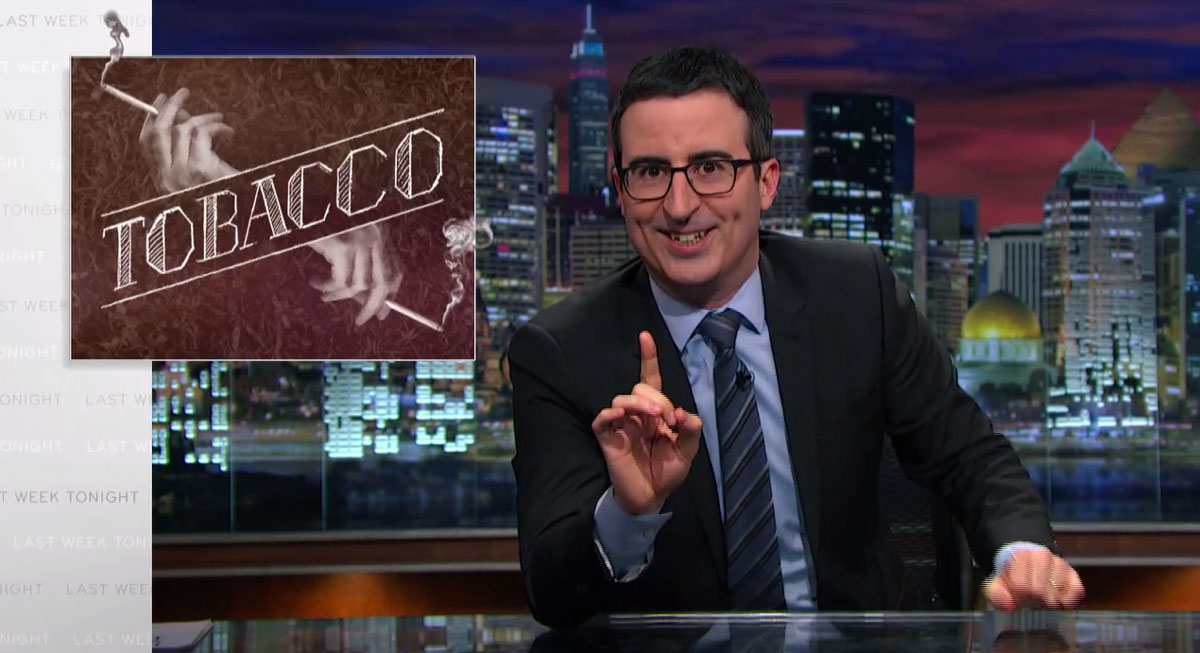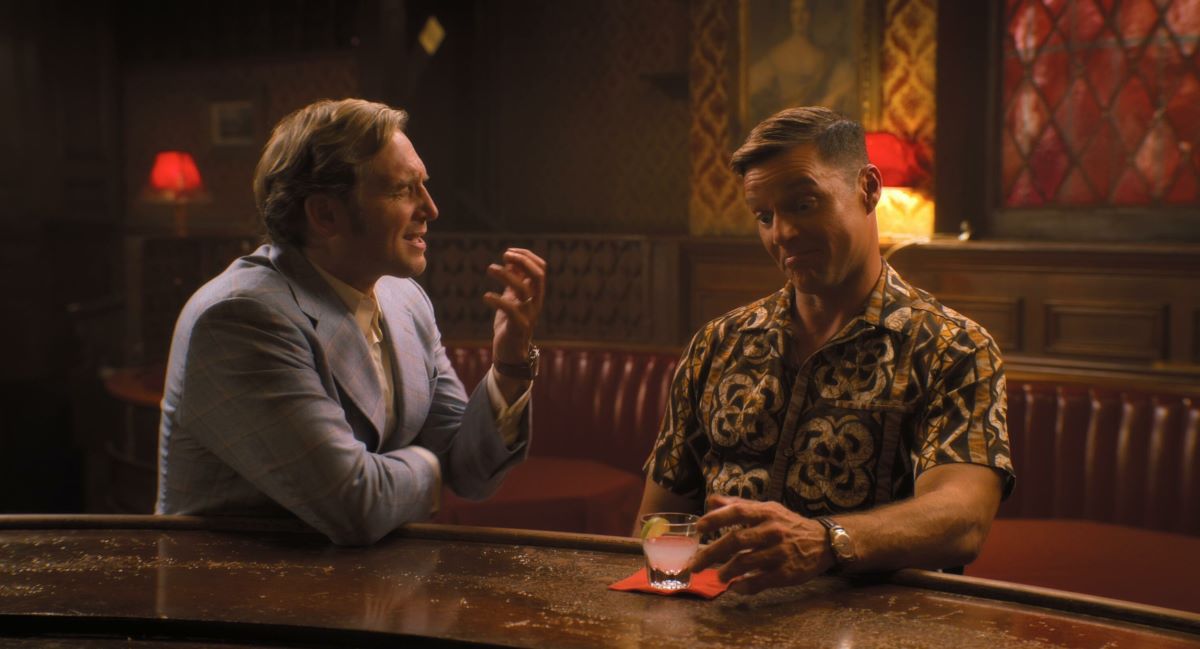Last Week Tonight with John Oliver
Season 2 Episode 2
Aired on February 15, 2015
Main segment: Tobacco
Other segments: Houthis, Fifty Shades of Grey
John: Welcome to Last Week Tonight. I’m John Oliver. Thank you for being with us. A quick recap of this week.
We begin tonight in Yemen. Home to 26 million Yemeni people and 27 million American drones. For years Yemen has worked closely with the US on counterterrorism issues. Unfortunately their government collapsed recently. This week, things got even worse.
The United States closing down its embassy in Yemen. The State Department evacuated dozens of diplomatic officials, urging all Americans to leave that country immediately.
John: Yes, if you are an American diplomat in Yemen, evacuate. If you’re an American tourist in Yemen, what the fuck were you doing taking a vacation in Yemen? Bad choice. A rebel group called the Houthis appears to be in charge in Yemen. So, who are they? And can we work with them?
When you speak to them, they’re quite polite and pleasant.
John: Lovely. How lovely. Rebels who are polite and pleasant. Y’know, like Drake. This all sounds like it’s tremendous news, unless I interrupted you too early.
They’re polite and pleasant, but one of their slogans is: death to America.
John: Okay then, okay. That is completely unacceptable. Unless they’re referring to the ’70s soft rock band America. In which case I totally support them. You’ve been through a desert on a horse with no name? Did it ever occur to you it’s your job to name the horse? Call it Cinnamon and ride back. You might notice he said, one of their slogans. And that’s because the full slogan reads: “God is great, death to America, death to Israel, curse the Jews,” “victory to Islam”, which is horrifying, but still slightly less odious than “I’m Lovin’ it.” Also there is some potentially good news here: not only are the Houthis against Al Qaeda. They may be actually trying to moderate their tone.
I interviewed their leader here and he was very adamant about trying to have better relations with the US and he even went so far as to repudiate their slogan and say “that’s just a slogan, we don’t mean it literally.”
John: Okay then. At this point the phrase “death to America” lost its meaning. It’s like, we should really hang out sometime or I’m sorry, or I love you, they’re things to say…
* * *
John: Moving on to other major news this week, we saw the worldwide release of Fifty Shades of Grey. It’s done surprisingly well, despite the fact that Jamie Dornan is not my Christian. Hashtag #notmychristian. The media has been very excited about this all week. Who would not be excited to watch scintillating dialogue such as this?
That’s impressive. You a girl scout? No, organized group activities aren’t really my thing. – So what is your thing? – I don’t know. Books.
John: My penis just yawned. I will say… This movie has provided a fascinating glimpse into the attitudes of various countries. The UK gave it their equivalent of an NC-17 rating, while Malaysia banned it, calling it more pornography than movie. Although, on the basis of that clip we saw, it’s more Home Depot commercial than pornography. There is one country that went in a different direction.
Here in the US, 50 Shades of Grey is rated R, kids under 17 must be accompanied by an adult. The French are giving the green light to kids as young as 12.
John: Yes, France is allowing 12-year-olds to watch Fifty Shades of Grey. That is maybe the Frenchest thing imaginable other than a croissant sitting in a café eating a baguette, or maybe a mime feeding invisible cheese to his invisible mistress with a visible erection. It’s pretty French. Just out of interest for me, what was the reasoning for such a rating?
The French official says isn’t a film that can shock a lot of people. The decision wasn’t unanimous but that’s only because some there thought there shouldn’t be any age restriction at all.
John: Even 12-year-olds in France will find the movie tame. It was an amusing erotic trifle, I suppose. The lovemaking was passable, belt play is pedestrian. N’est pas?
* * *
John: Finally: a little update on Ecuador. You may remember last week, we poked fun at their president, Rafael Correa, who’d been calling out his Twitter and Facebook critics by name and encouraging supporters to attack them online. He saw what we did and was not thrilled. And the reason I know, and this is true, the President of Ecuador has been shit-talking me on Twitter all week long, saying, and this is true, among other things… He said “these gringo talk shows are as unpleasant as a diuretic. Do British comedians exist? Are you all sure about this?” And he’s right. British comedian is an oxymoron. Much like jumbo shrimp or Ecuadorian President who prioritizes his time wisely, but it gets worse. Just yesterday, Correa gave his weekly televised address to the nation and he was still annoyed about this.
With international backing there is a funny campaign that says that we are against humor because now they will show you Twitters that we want to stop. Imagine that, me, against humor? But my jokes are known worldwide!
John: Let me stop you there. That’s almost true. It’s not so much that your jokes are known worldwide, as that you are becoming known worldwide as a joke. That’s the thing… I would stop this. I would stop making fun of Correa’s oversensitivity, but he has a history of stifling dissent in Ecuador. He’s clamped down on journalists, from suing a newspaper that said he was acting like a dictator, to humiliating a young female reporter who asked him a tough question, calling her a horrible fatty. Fatty is one of the least presidential words imaginable. It’s right up there with awesomesauce and fingerblast. You don’t want to hear that from a world leader.
There is one thing however I would like to correct from last week. I showed a clip of this clown during Correa’s speech. It turned out that was actually no random clown. That was Tiko-Tiko, a beloved children’s entertainer. Tiko-Tiko was upset and called me grotesque. When a clown calls you grotesque, it hurts. I will apologize to Tiko-Tiko, and I’ll tell you why, because I do not want this man angry with me. That plays in the background when a psychopath ties you up and tortures you with dental instruments. I am sorry, Tiko-Tiko. Please don’t make me saw my leg off to escape you.
* * *
And now, this. Last Week Tonight asks, how is this still a thing? Sports Illustrated swimsuit issue. How is this still a thing? Sports Illustrated, the preferred magazine of dads since 1954, highlighting great moments in sports, from the miracle on ice to that one time Vince Lombardi got punched by Green Bay Packers. Every February, S.I. releases its most popular annual issue to a creepy chorus of approval.
Check it out, Mike Jerrick, look at the screen. The swimsuit issue is coming out next Tuesday, a great magazine.
It’s even worse when the models are in the studio. Will you be my Valentine? I want the chocolate but there’s a little bit of a waiting list. Thank you so much. Courtney, I love you baby. Courtney is Taryn’s wife. Expecting their first child any moment now.
The swimsuit edition was created by Andre Laguerre in 1964, to boost sales between sports seasons. It was a perfect expression of the sixties, a time of such rampant casual sexism, that it eventually gave birth to the sexual harassment in the workplace film.
If you two want to get knocked up, John and I are glad to help you.
But as society moved on, the swimsuit issue not only hung around, it became the magazine’s key selling point.
You get basketball, football, tennis, golf and… And the famous swimsuit issue.
Revealing 1991 swimsuit issue and the free sneaker phone.
The swimsuit issue.
That’s the icing on the cake.
The swimsuit issue is still moving copies. It sold more than 800,000 copies on newsstands in 2013, more than 10 times what a regular issue of Sports Illustrated sold. Which raises the question, why? Sure at one point it was tantalizing to receive a once-annual printed magazine of scantily clad women. Do people not understand they could now just type “naked ladies” into the internet and see what Google throws at them? Even S.I. seems to know it’s losing relevance, every year they provoke an attention grabbing controversy. Whether it’s using other country’s citizens as props.
Some are calling them at best, culturally insensitive.
Objectifying women with an actual object.
Barbie is on the cover of the swimsuit issue and there is outrage.
Or this year, baiting the media with this bullshit.
Some are questioning whether the cover is too lewd. Too risqué? When the line goes this far, what’s left?
The vagina is what’s left and one of these years, in an act of desperation, S.I. will put one on the cover. Until that time, it’s left to the rest of us to ask ourselves: the Sports Illustrated swimsuit issue, how is this still a thing?
* * *
John: Moving on. Our main story tonight is tobacco. It used to be a cornerstone of American life. It was how we knew sex was over before the female orgasm was invented. Even if you didn’t smoke, you could not escape those who did. Cigarettes were in the hands of trusted newsmen, beloved cartoon characters, and cowboys in TV commercials.
You had your supper and coffee, the horses are settling down, you start to think about Saturday night in town. Come to where the flavor is. Come to Marlboro country.
John: That’s the iconic Marlboro man, as synonymous with freedom as he was with dying from smoking-related diseases because that’s what happened to at least four of the actors who played him. Four dead actors! It’s like if there was a gas leak on Whose Line Is It Anyway? Why did you all have to yes and each other?
It is weird seeing cigarette ads now. For the past half-century, America steadily limited how tobacco companies are able to behave. We’ve put warning labels on packaging and banned cigarette ads, executives defended themselves against public-health questions.
It’s true, that babies born to women who smoke are smaller, but they’re just as healthy as the babies born to women who do not smoke and some women prefer having smaller babies.
John: You heard it, pregnant ladies: enough cigarettes and you’re pretty much just shooting out Lego babies. They fit in Star Wars toys! Who wouldn’t want that? That’s adorable! By the late ’90s, tobacco companies retired not just the Marlboro man, but also Joe Camel, whom people ridiculously accused of being targeted at children, because he was a cartoon camel who dressed like the Fonz and smoked. These restrictions helped lower smoking rates in the US from about 43 percent in 1965 to 18 percent today. Which you would assume would decimate the American tobacco industry. Which is what makes this clip from 2008 so surprising.
Tobacco is what you might call, smoking hot. Is this the best time ever to be a tobacco farmer?
Probably the most profitable.
John: It’s an aging product that’s decreasing in popularity, and yet it just can’t stop making money. It’s the agricultural equivalent of U2. One of the reasons for this might be that while Americans smoke less, in some parts of the world, people are smoking more, to an occasionally shocking extent, you might remember this video.
The video of this two-year-old boy, he’s just puffing away on a cigarette. The mom says he is totally addicted and if he doesn’t get the smokes, he gets angry, starts banging his head on the wall.
John: He gets mad when you take away his smokes. He thinks they’re gone, he doesn’t have object permanence yet! The smoking baby was such a sensation, news crews attempted to find him.
Just across this bridge, lies the small fishing village that is home to the smoking baby. We briefly caught up with Aldi and his mother at the airport, flanked by a local TV crew. Are you Aldi? Hi, I’m Dan. How you doing, little dude?
John: Holy shit, look at that kid. He’s his own rat pack. He’s missing three other kids dressed like him and a casino. And this is where this story gets really interesting. That baby’s favorite brand was A Mild, owned by Philip Morris, the company that sells Philip Morris brands everywhere but America. They, like other multinational companies, have flocked to Indonesia, where two-thirds of adult males smoke and there are few restrictions. And I do mean very few.
This brings home the point, this is the entrance to a school. A few steps from the entrance, there is this kiosk sponsored by Marlboro Lights. A student can come and buy an individual cigarette, they’re only a dime a piece and they have a lighter on a string.
John: Of course the lighter’s on a string! What kind of irresponsible cigarette vendor outside a school would let a child walk away with a lighter? They’re dangerous. Just think about that. Indonesia is far from the only country where PMI expanded. They own seven of the world’s top 15 international brands, including Marlboro. And recently, Marlboro boosted its global market share, thanks to its worldwide “don’t be a maybe, be Marlboro” campaign. If you think: what the fuck does “don’t be a maybe” mean? Let the video by the people responsible for the campaign explain it to you:
As a brand, Marlboro was not resonating with adult smokers, though its values of freedom, authenticity, master of destiny were. Smokers missed the essence of the cowboy, which led us to our opportunity. Eliminate the word “maybe” from our smokers’ vocabulary, to become the catalyst that inspires smokers from just thinking about life to taking the lead in their life. To live the Marlboro values. To be true, bold, and forever forward.
John: That is a pile of horseshit. Even, think about it… even Don Draper looks at that ad and goes, “Pull it back a little bit”. “These are cigarettes we’re talking about, not Jesus.” Countries can try to counteract the influence of that kind of marketing. But if tobacco companies feel too threatened, they’ll put them through legal hell. Let me take you on a world tour of how they attack public health laws. It’s kind of amazing. Let’s start in Australia. In 2011, they passed a plain packaging law. What that means is this.
Cigarettes come in packaging like this. Drab coloring, messaging the Australian government rights, pictures, the brand name relegated to the bottom.
John: Australia’s plain packaging law banned tobacco-company branding from packaging, and replaced it with upsetting photos. Toe tag on a corpse, the cancerous mouth, the nightmarish eyeball, or the diseased lung. I’m pretty sure I would find a healthy lung disgusting. But that thing look like you’re trying to breathe through baked ziti. So just take that down. Since this law was implemented, total consumption in Australia fell to record lows. And nightmares about eyeballs have risen to record highs. Take down the demon eye. To get these laws, Australia has had to run a gamut of lawsuits. First, two tobacco companies sued Australia in its highest court to stop them. The result was surprising, as Australia’s Attorney General let everyone know.
We have won that legal action and just as some icing on the cake, it seems that the big companies will pay the government’s costs.
John: Yes! Score one for the little guy. Even if that little guy is the sixth largest country in the world. The tobacco companies didn’t just lose. Judges called their case delusive, unreal, and synthetic and said it had fatal defects. Which sounds a little like the early reviews of NBC’s “The Slap”. What is this thing? How long am I supposed to watch it for? Which one is the slap? But Australia’s legal troubles were just beginning. Philip Morris Asia got involved.
The company is threatening to take the Australian government to an international court and says that removing brands from cigarette packs will lower the value of its trademark and intellectual property.
John: A company was able to sue a country over a public-health measure, through an international court. How the f*ck is that possible? It’s really a simple explanation. They dig up a 1993 trade agreement between Australia and Hong Kong, in which Australia couldn’t seize Hong Kong-based companies’ property. Nine months before the lawsuit started, PMI put its Australian business in the hands of its Hong Kong-based PM Asia division and then, they sued, claiming that the seized “property” were the trademarks on their packages. You’ve gotta give it to them: that’s impressive. Someone should give those lawyers a pat on the back. And a punch in the face. But a pat on the back first. Pat then punch. Pat, punch. They need a pat punch. Little pat big punch, that’s what they need. You’ll never guess who else is coming after Australia.
Three governments, Honduras, the Dominican Republic, and Ukraine have filed complaints with the WTO against Australia’s laws.
John: Ukraine is charging Australia with hurting its tobacco exports. Which was a surprise to a Ukrainian member of parliament.
When I first read about the position of the government, it seems to me a joke, cause we have zero trade exchange between Australia and Ukraine of any tobacco goods.
John: Zero trade! Zero. Ukraine is inserting themselves into something they have nothing to do with. They take the Kanye West approach to international trade disputes. Just wiggling in there. The truth is, tobacco companies have encouraged these suits, even covering some of the legal costs. The tobacco industry is treating Ukraine like a stage parent treats a child in a beauty pageant. Brandy wants to do it! Yes, I paid for her outfit and I’ve pushed her onto the stage, but this was all her idea. Brandy, if you drop that flaming baton, you are f*cking walking home. You walk home, Brandy! And tobacco companies aren’t just going after big countries.
PM launched a legal challenge against the small country of Uruguay for damaging its business prospects. Uruguay has a population of just three and a half million people and is a relatively tiny cigarette market.
John: Philip Morris International is currently suing Uruguay. A country you think about so little that you didn’t even notice that that’s not Uruguay, this is Uruguay. Now the background here. Nine years ago, Uruguay started introducing increasingly larger health warnings. Smoking rates dropped and Uruguayans liked the laws, with 68 percent of smokers saying they should be stronger. But that hasn’t stopped PMI from suing them for the past five years. And that’s a lot for a small country to take on. Luckily, they have had help.
Uruguay has received the support of the World Health Organization and the Pan American Health Organization, as well as the mayor of New York, Michael Bloomberg, who donated $ 500,000 for payment of attorney’s fees.
John: The legal fees were getting so expensive, they had to take money from Michael Bloomberg. On the scale of how shitty that has got to feel, it’s just barely higher than borrowing money from your ex-girlfriend’s, current boyfriend’s stepdad. And if forcing Uruguay to do that was not bad enough, let me tell you what PMI has done to Togo. Togo is one of the ten poorest countries on earth. And they unveiled some new tobacco laws.
Togo is setting conditions on the sale of tobacco. Starting on September 1, 2014, packs of cigarettes sold in Togo must bear warnings in French, Ewé and Kabiyé about the health risks associated with the consumption of tobacco.
John: At first, written warnings sound great. Until you learn that 40 percent of the adult population is illiterate. Which is why some members of the Togolese government wanted something more like Australia’s ziti lung packaging. Take it down. It’s still disgusting. When they got wind of this, Philip Morris International, a company with annual net revenues of $80 billion, threatened to sue Togo, whose entire GDP is $4.3 billion. When your GDP is only a couple of billion more than the box office of Avatar, a protracted legal case is not really what you need. We reached out to Togo and asked to see their correspondence with the tobacco companies and they gave us this letter from PMI. We had to translate it from French, but it was worth it. This thing is comically appalling. It informs Togo that plain packaging laws would result in an incalculable amount of international trade litigation, suggesting Togo would lose any legal challenge by citing an Australian high court decision, which they write: “plain packaging constitutes a privation of property rights.” The court case they’re referring to is the one from earlier. The one tobacco companies lost so badly, they had to cover the court costs. Yet they quote the one judge in that case who ruled in favor of tobacco, ignoring the other six who called their case — if you remember — delusive, unreal, and synthetic and saying it had fatal defects. Like when a shitty movie engineers a good review out of a bad one, like Mortdecai is a pile of dot dot dot great. This letter is bullsh!t. Yet Togo, justifiably terrified by threats of billion-dollar settlements, backed down from a public health law that many people wanted. And it’s not just Togo. BAT sent a similar letter to Namibia. And one of their subsidiaries sent one to the Solomon Islands, a country with a population of 600,000. It’s safe to say, if you live with at least two other people and you ask one of them to smoke outside, you can look forward to a letter from a tobacco company very soon. I could get angry and I could call tobacco companies assholes or monsters or open sores on Satan’s d!ck. Let’s rise above it and let’s try and broker peace. It’s clear what each side wants: countries want to warn their citizens about the health dangers of smoking tobacco. Tobacco companies want to present branded images. May I suggest a compromise? I present the new face of Marlboro: Jeff, the diseased lung in a cowboy hat. We are offering Jeff to you, PMI, to use as you wish. Put him on your billboards! Put him on some ads! In fact — and don’t be mad —, we’ve already started doing it for you. This is an actual billboard we have put up in Uruguay of Jeff the diseased lung. That is in Montevideo now. And people seem to like it there! Of course, they like it! Everyone loves Jeff the diseased lung in a cowboy hat! One more thing. To be completely honest, we didn’t just do it in Uruguay. We also — and don’t be mad —, we made some Jeff-branded t-shirts and we shipped them to Togo, where they’ve been a hit. If you don’t believe me, check this out.
Marlboro, Jeff’s already out there! You just need to claim him. Our lawyers, unlike yours, will not sue! I know our viewers would love to help you get the message out there. You can tweet about Jeff using the hashtag #jeffwecan to get him trending worldwide and get PMI’s attention. Post Jeff’s photo on Google Plus and tag him Marlboro, which might push him to the top of Marlboro’s Google image search. We can do this, everyone! Don’t be a maybe about this! Who here would like to meet Jeff? Let’s bring Jeff out! Come on, Jeff! It’s Jeff everyone! It’s Jeff the diseased lung! Look at him, Marlboro, he’s not a maybe! He’s not a maybe because he’s suffering from emphysema. Aren’t you, Jeff? Classic Jeff! And guess what, PMI? Even though, you do not market to children, kids love Jeff, too! Don’t you, kids? What do you say, Marlboro? Let’s make Jeff happen!
That’s our show, see you next week, goodnight!





